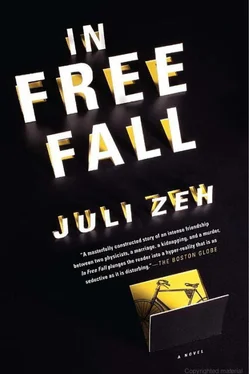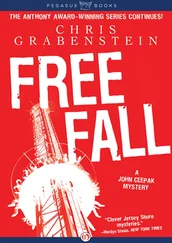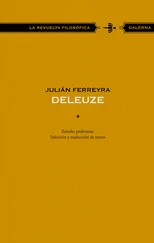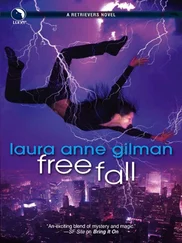Standing with their elbows on the sticky surface of a table, they listen to the soft squeaking of mozzarella between Schilf’s jaws.
“I’m burning in hell,” Rita says with a mixture of derision and wonder, “and you’re eating cheese.”
Broad shafts of sunlight suddenly fall through the glass front of the station, turning the people in the concourse into slivers of themselves. In the midst of this biblical light show, an unimpressed Rita Skura counts off the hell she is talking about on her fingers.
“Scandal at the hospital. Beheaded cyclist. And to top it off, a lunatic who is claiming that his son was kidnapped, though the son knows nothing of it.”
Schilf lowers his sandwich. “Oh?”
Rita picks up a piece of tomato that has dropped onto the table and puts it in her mouth. “Some family nonsense. The man reports a kidnapping and as soon as the phones are bugged, the boy calls from holiday camp, safe and sound.”
“And the father?”
“Apologizes profusely, withdraws his report, and assures us that no further investigations will be necessary.”
“That’s not for him to decide.”
“I know. But the case will peter out anyway. We have more important things to do.”
“Oh, the cyclist,” Schilf says. “You shouldn’t worry so much about him.”
Her index finger is pointing like a weapon at his head—directly at the bird’s egg, he thinks, feeling a faint pulsing.
“Don’t play Superman with me,” Rita says.
“I meant well.”
“In case you failed to notice when you read the file, this cyclist was the right-hand man of Medical Director Schlüter. Strange coincidence, isn’t it?”
Schilf suppresses a yawn, passes her the rest of his sandwich, and wipes his hands on a paper napkin.
“The press is roasting us on a spit,” Rita says with her mouth full. “People don’t like it when the gods in white are under suspicion.”
“And you come to the station yourself and wait an hour to welcome me in person?”
Rita shoves the last piece of bread into her mouth and chews for far too long. She does not object when Schilf takes a pack of cigarillos out of his pocket.
“I wanted to talk to you without being disturbed,” she says in an unusually quiet voice.
“This is a no-smoking station!” the sandwich man calls from behind the counter.
“And this is a smoking madman with good friends in the health and safety inspectorate!” Rita shouts back.
Schilf blows smoke through his nostrils and observes the play of light on the wisps as they rise through the air. The sandwich man starts wiping his counter.
“Experimenting on patients,” Rita says. “Horrible stuff, don’t you think?”
“The kidnapping guy,” Schilf says. “What does he do?”
“He’s a professor of physics,” says Rita. “But that’s not what this is all about. Just try proving that a doctor has done something wrong. They’re all stonewalling. That’s where you come in. Detective Schilf?”
Schilf is no longer listening. He has wedged the cigarillo between his teeth, picked up his bag, and has already walked a few steps toward the exit.
“Come on,” he calls over his shoulder.
Behind the glass doors is a solid wall of heat. It shimmers in the air above the lipstick-red Corsa in the no-parking zone. In a sudden fit of respectfulness, Rita opens the rear door for Schilf. Moved by this, the detective climbs into the backseat. He had hoped for air-conditioning, but there is none. While a cursing Rita attempts to ease the car into traffic, Schilf finds time for a move with his knight that has occurred to him as a final opportunity for salvation. His defense is in tatters, his queen barricaded in by her own officers. Fleeing forward is his only option, moving another piece into the disputed area of the enemy kingdom. A gap opens up for Rita. The car moves forward in fits and starts. Her eyes seek out the detective’s gaze in the rearview mirror.
“Let’s get to the point, Schilf,” she says. “I wanted to suggest that you call the police chief.”
He has made a mistake that is stupid even for a beginner. The move was so irresponsibly rash that Schilf can hardly believe it when his knight disappears with a brief flicker of the screen. In the heat of battle, he has omitted to protect a particular square. He sinks back into the synthetic upholstery, exhausted. Rita’s Corsa is one of those cars that will always smell like new. The detective considers abandoning the game, tipping his own king over and surrendering. He looks out of the window in a rage. He sees light patches on the grassy banks of the Dreisam. Snowdrifts or seagulls that are lying on their fronts with their wings spread wide, or sleeping sheep, if sheep ever sleep—he is not entirely sure on this point. Rita clears her throat.
“Listen, Schilf. Tell the chief that you are urgently needed for the hospital scandal. And leave the cyclist, who you don’t think is important anyway, to me.” She casts him a wary look in the rearview mirror. “The cases are closely connected. We would be working together either way.”
Schilf saves the game for later. He thinks longingly of a world in which he has not made that stupid move with his knight and in which he wins every game against the chess computer, which is why he must always lose in this world: for there is no victory or defeat and no right or wrong; rather: victory and defeat as well as right and wrong.
“Are you even listening?” Rita asks.
“No,” Schilf says. “But you can keep the cyclist. And the rest of all that nonsense. I’ll take on the physics professor. Now look where you’re going.”
“Why?”
“Because of the traffic light!”
She slams on the brakes, and a treble C rings out. The detective’s slack body folds around the seat belt. He rubs his stomach, groaning.
“But why,” Rita says suspiciously as she reverses the car out of the intersection, “why don’t you want to do the job on account of which you’ve come here specially?”
On account of which . Schilf knows why he liked Rita Skura from the moment he met her. In her own way, she is as lost in this world as he is. He aims a wintry smile at the rearview mirror. He’s going to be sick if they don’t get there soon.
“At my age,” Schilf says, “you no longer judge crimes by their prominence.”
“Not according to your most recent successes.”
“Listen to me, Rita. You can have Dabbelink.”
Rita does not quite manage to hide her pleasure. She turns into Heinrich-von-Stephan-Strasse with a flourish, lifts her pass up to the machine at the entrance, and parks in the shade of a tree, for the places under the corrugated iron roof have long since been taken. She rests her hands on the steering wheel. In the sudden silence, the birdsong is surprisingly loud.
“I have never forgotten that I must proceed from the opposite of my own convictions,” Rita says. “Going by this rule, I will actually have to trust you.”
“You are a good child,” Schilf says.
The moment of weakness passes. Rita kicks open her door, plants her feet squarely on the ground, and waits with her fists pressed into her sides for Schilf to emerge from the car.
“This is how it’s going to be,” she says. “For as long as you’re here, we’ll be sharing an office. My office.”
She locks the car and holds the detective back when he starts walking toward the building. He looks down at her and feels the hint of a fatherly smile on his lips.
“Two more things,” she says. “First—no tricks.”
“I have a new girlfriend, by the way,” the detective says.
“Are you sure she isn’t a social worker who visits you regularly?”
“Not at all sure,” says Schilf. “I’ll get the file on the physicist and pay him a visit. You can look after my bag in the meantime.”
Читать дальше












